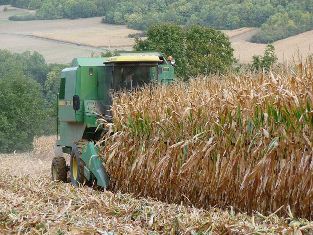 COACHELLA, Calif. — Inspired by the mass quantities of food Americans throw away, Christy Porter decided to tackle the hunger problem in the Coachella Valley over ten years ago.
COACHELLA, Calif. — Inspired by the mass quantities of food Americans throw away, Christy Porter decided to tackle the hunger problem in the Coachella Valley over ten years ago.
"(With) 27 percent field waste and 30 percent plate waste," says Porter, "there is no reason for anyone to be hungry in our country."
Taking matters into her own hands, Porter founded Hidden Harvest in 2001, a non-profit that "rescues" produce from eastern Coachella Valley fields and distributes them to over 60 agencies serving low-income residents throughout the region.
The Coachella Valley, a strip of inland desert in southern California that extends 45 miles from the San Bernardino Mountains of Riverside County to the Salton Sea, is the fifth largest agriculture-producing region in the United States. It is primarily known as a date-producing region – roughly 95 percent of all the nation's dates originate in the Coachella Valley – but residents here are quick to point out that the fertile valley produces nearly every type of vegetable and fruit imaginable.
Despite the bounty of food grown in the Coachella Valley, however, not even three-quarters of the produce ultimately winds up on people's dinner plates. Produce is regularly left to wither away and die, when a grower determines that the price of harvesting their product outweighs their ability to sell it for a profit.
The image of food literally rotting on the vine is especially ironic in a place like the east Coachella Valley, where poverty and malnutrition are highest in those communities that are home to the very farm workers who harvest the crops.
Porter's fight against hunger took root in one such community, Mecca, where she began by building edible gardens at Saul Martinez Elementary School. She was struck by a question posed to her by a father at the school: Why is so much of the food left to rot in the fields where I work?
"When I came here, we didn't need policy as much as we needed food," she says. "Kids can't eat red tape while you're waiting for policy to take effect. People are still hungry."
Local farmers notify Hidden Harvest when there is product left in the fields that would not make it into grocery stores due to cosmetic blemishes or cost to harvest. The non-profit quickly hires crews to harvest the remaining produce.
"Our biggest problem is not that the produce, it's out there. It's getting the farmers to remember to call us before they plow it up," explains Porter, who believes tax incentives for participating farmers would be helpful. "It is big business for them to hold a crop in the field, even for one day."
"Produce is getting harder and harder to come by," says Porter. "Since 2008, the demand for food in food banks has gone up 60 percent. We were probably serving 20 to 25 thousand people back then, but farmers started selling more and more and more of their products so our access to products went down about 50 percent."
It is a constant struggle for Hidden Harvest to access produce when supply is down, but the need within the community is still prevalent.
"I find it hard to get enough produce to feed the beast," says Porter.
"We haven't had any help from federal or state dollars. It's not that we are opposed to it, it's just we haven't had any. We are kind of small, so we are trying to get money by grants or by public contribution, but that's a lot of work. That's what I do all the time. I'm raising money day and night."
This fall, Porter plans to light a fire and challenge California farmers with a program called Just One Row.
"We are going to try to persuade our farmers to give us just one row of each of their crops," said Porter. "We know that one row, one row, of carrots is ten thousand pounds of carrots. That is a lot of carrots. We could do a lot with that."
In the quest to end domestic hunger, Hidden Harvest employs about six hundred local farm workers during the course of the year, to go onto farms and harvest the crops that would otherwise be bulldozed or left to rot. The organization feeds, educates, employs, and inspires hope within the community year round, often using Porter's own photography -- she was an accomplished photojournalist in her previous career -- as a catalyst.
"How can you photograph hunger?" asks Porter. "Part of our job is to convince people that it is out there."
The author, Aurora Saldivar, is an eastern Coachella Valley native and a reporter for Coachella Unincorporated, a hyper local and youth-led news organization founded by New America Media to shed light on health and community related issues in Coachella and the surrounding unincorporated communities of the east valley. The project is supported by a grant from The California Endowment.
- Home
- News
- Opinion
- Entertainment
- Classified
- About Us
 MLK Breakfast
MLK Breakfast- Community
- Foundation
- Obituaries
- Donate
04-25-2024 1:36 pm • PDX and SEA Weather






















































































































































































































































































































